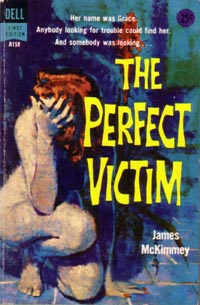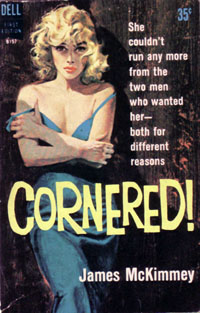James McKimmey's The
Perfect Victim and Cornered! by Bill Crider
Once upon a time in America, even in
small Texas towns like the one I grew up in, you could go to the corner
drugstore and find a spinning wire rack that held paperback books that sold for
a quarter. That’s right, a mere twenty-five cents, one-fourth of a dollar.
And what did you get for your quarter?
Well, if you were lucky, the drugstore rack was stocked with, among other
things, Gold Medal Books and Dell First Editions. The novels these lines
published weren’t long. In fact, the books are sometimes nearly as thin as the
quarter you paid for them, generally around 144-160 pages, but they were always
worth the money. Sometimes the covers alone were worth the money. Gold Medal
Originals were the top of the line, but the Dell First Editions weren’t far
behind. The Dell books featured some of the same authors as Gold Medal (Charles
Williams, John D. MacDonald) and others, like James McKimmey, whose work was
always satisfying and entertaining. McKimmey, like a lot of the paperback
writers of those days, could tell a tight, exciting, well-plotted story with
characters you cared about and do it in a hundred and sixty pages.
 A
case in point is The Perfect Victim (Dell 1958), in which McKimmey
demonstrates his ability to handle a large cast of characters while moving the
story right along. The novel is set in a small Midwestern town that traveling
salesman Al Jackson things is likely to be "about as lively as a Baptist
church on a Monday morning." What Al doesn’t know, of course, is that the
town is going to be really jumping before long, and Al’s going to wind up
accused of the murder of Grace Amons, a popular waitress in a local café. It’s
not giving away any secrets to say that Al’s not guilty. This book isn’t a
whodunit, as the reader knows the killer’s identity. The question is one of
whether the killer will get away with what he’s done. And for a good while, it
looks as if he will.
A
case in point is The Perfect Victim (Dell 1958), in which McKimmey
demonstrates his ability to handle a large cast of characters while moving the
story right along. The novel is set in a small Midwestern town that traveling
salesman Al Jackson things is likely to be "about as lively as a Baptist
church on a Monday morning." What Al doesn’t know, of course, is that the
town is going to be really jumping before long, and Al’s going to wind up
accused of the murder of Grace Amons, a popular waitress in a local café. It’s
not giving away any secrets to say that Al’s not guilty. This book isn’t a
whodunit, as the reader knows the killer’s identity. The question is one of
whether the killer will get away with what he’s done. And for a good while, it
looks as if he will.
The villain of the piece is Buggie
Alstair, who’s visiting Willow Creek with his friend Roger Cook. Roger, who’s
just finished his freshman year, and he’s impressed with the fact that Buggie,
a BMOC (he even has a convertible), has condescended to spend some time with
him. Buggie at first seems a bit like Eddie Haskell of Leave It To Beaver
fame, but it turns out that he’s much more dangerous. In fact, he’s, well,
buggie. Grace has her own plans for Roger, but things go wrong, and she winds up
dead, the perfect victim. The town goes a little crazy for a while. Human
decency wins out, but not before McKimmey has shaken up and changed a big
percentage of the population. There aren’t any heroes in this book, just a
group of people like the ones you know or the ones you grew up with. Most of
them are trying to do the right thing, but not all of them. Some of them get
what’s coming to them, and some of them don’t. Just like real life. And if
everything’s tied up neatly in the end, that doesn’t mean that all the
characters are going to live happily ever after, especially Roger, who at least
manages to grow up a little even as he’s being led away to a jail cell.
 Another
little gem by McKimmey is Cornered! (Dell 1960). There’s a terrific
opening scene set in a service station (this was back in the days when the word
"service" actually applied). It’s both darkly comic and suspenseful,
and it ends with a big bang. The setting is another small, close-knit community,
Arrow Junction, and the bang referred to in the previous sentence is caused by
two hired killers who’ve come there to put the quietus on Ann Burley, a
potential witness against their boss. The story is complicated by a snowstorm
and by people like Bob Saywell, a local bigshot who’s figured out who Ann
Burley is and thinks he might be able to use the information to his sexual
advantage; Ann’s husband, Ted, who’s not worthy of her; Hugh Stewart, who’s
in love with her; and various other townspeople and visitors who are eventually
held hostage by the hit men in a small restaurant owned by Saywell. McKimmey
manipulates the plot and orchestrates the cast (which also includes the local
law) with a sure hand. As in The Perfect Victim, the story is moved right
along by McKimmey’s economical prose. There are any number of small surprises
and pay-offs along the way as we discover which characters are going to act in
the ways we expect and which are not.
Another
little gem by McKimmey is Cornered! (Dell 1960). There’s a terrific
opening scene set in a service station (this was back in the days when the word
"service" actually applied). It’s both darkly comic and suspenseful,
and it ends with a big bang. The setting is another small, close-knit community,
Arrow Junction, and the bang referred to in the previous sentence is caused by
two hired killers who’ve come there to put the quietus on Ann Burley, a
potential witness against their boss. The story is complicated by a snowstorm
and by people like Bob Saywell, a local bigshot who’s figured out who Ann
Burley is and thinks he might be able to use the information to his sexual
advantage; Ann’s husband, Ted, who’s not worthy of her; Hugh Stewart, who’s
in love with her; and various other townspeople and visitors who are eventually
held hostage by the hit men in a small restaurant owned by Saywell. McKimmey
manipulates the plot and orchestrates the cast (which also includes the local
law) with a sure hand. As in The Perfect Victim, the story is moved right
along by McKimmey’s economical prose. There are any number of small surprises
and pay-offs along the way as we discover which characters are going to act in
the ways we expect and which are not.
In both novels, McKimmey’s interest
is as much in character as in action. It’s not that there’s a shortage of
the latter; it’s just that the interplay of the characters is what raises the
books above the ordinary and makes them engrossing reading even today. Books
that were supposedly disposable entertainment, to be bought for a quarter and
then tossed away, have proved to be a better value than anyone at the time of
their original sale ever imagined.
Copyright© 1971 Bill
Crider
***
Read
an extract from The Perfect Victim
Read
an extract from Cornered!
BILL CRIDER lives in Alvin, Texas. He won the Anthony
award for his first mystery novel, Too Late To Die, featuring Sheriff Dan
Rhodes. The most recent book in that series is A Romantic Way to Die.
Crider and his wife, Judy, won the Anthony for "best short story" in
2002 for Chocolate Moose, a Dan Rhodes story. Crider also writes
several other series, one about Truman Smith, a private eye who lives in Galveston, another about a university English teacher named Carl Burns,
and one about Sally Good, a community college teacher. The first Truman
Smith book, Dead on the Island, was nominated for a Shamus award.
Stand-alone novels include The Texas Capitol Murders, and Blood Marks.
Crider has also written four children's books, the most recent of which are Mike
Gonzo and the Sewer Monster, Mike Gonzo and the Almost Invisible Man,
and Mike Gonzo and the UFO Terror, the last of which won the Golden Duck
Award for best juvenile science fiction novel of 1998.
Contact Bill
 A
case in point is The Perfect Victim (Dell 1958), in which McKimmey
demonstrates his ability to handle a large cast of characters while moving the
story right along. The novel is set in a small Midwestern town that traveling
salesman Al Jackson things is likely to be "about as lively as a Baptist
church on a Monday morning." What Al doesn’t know, of course, is that the
town is going to be really jumping before long, and Al’s going to wind up
accused of the murder of Grace Amons, a popular waitress in a local café. It’s
not giving away any secrets to say that Al’s not guilty. This book isn’t a
whodunit, as the reader knows the killer’s identity. The question is one of
whether the killer will get away with what he’s done. And for a good while, it
looks as if he will.
A
case in point is The Perfect Victim (Dell 1958), in which McKimmey
demonstrates his ability to handle a large cast of characters while moving the
story right along. The novel is set in a small Midwestern town that traveling
salesman Al Jackson things is likely to be "about as lively as a Baptist
church on a Monday morning." What Al doesn’t know, of course, is that the
town is going to be really jumping before long, and Al’s going to wind up
accused of the murder of Grace Amons, a popular waitress in a local café. It’s
not giving away any secrets to say that Al’s not guilty. This book isn’t a
whodunit, as the reader knows the killer’s identity. The question is one of
whether the killer will get away with what he’s done. And for a good while, it
looks as if he will.